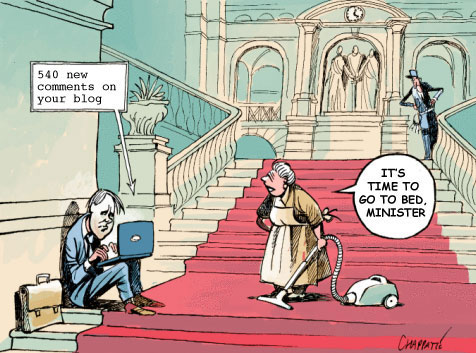Politicians discover dimensions of cyberspace

Switzerland's political parties are making increasing use of the internet in the run-up to October's parliamentary elections.
But so-called blogs, video clips, podcasts and chat forums are not as common as in the United States and France.
Communications Minister Moritz Leuenberger attracted considerable media attention when he launched his blog – a form of interactive diary – earlier this year.
He is not the only politician in Switzerland to venture into the realms of cyberspace, but so far only a few others, including the mayor of Zurich, have followed him.
Many parliamentarians have set up their own websites, but they rarely go beyond the conventional offering of texts and some pictures.
Being part-time politicians, only very few of them have the time and financial resources to manage more sophisticated sites.
Inside and outside
The main political parties point out that the internet is a key tool of candidates campaigning among potential voters living abroad, but not only there.
“E-voting would not only be very practical for expatriates, but also for voters in Switzerland,” says Alexandra Perina-Werz of the Christian Democratic Party.
But posters, flyers, advertisements in the press and – above all – a presence at public events are still considered the most important instruments in the campaign.
“You risk losing an election, if you ignore the internet. But you can’t win an election only because you are present on the internet,” says Reto Nause, secretary-general of the centre-right Christian Democrats.
The party offers an online quiz for visitors to the site, while the centre-right Radical Party and the rightwing Swiss People’s Party provide their candidates for the October elections with content, or even a content management system, for their personal internet sites.
The centre-left Social Democrats who aim to be “the leading internet party” alongside the Green Party, have launched blogs and e-cards, an electronic campaign postcard.
Target audience
Communication experts say the internet is an ideal instrument to spread information directly among users and to reach the target audience.
“Blogging has become a must in modern politics, ” says public relations expert Dominik Allemann in Zurich.
He adds that blogging and other interactive community elements make it possible to generate maximum attention in a very short time.
But he points out the need to keep blogs up-to-date to be able to react promptly to comments by users.
Surveys have found that the advantage – in principle – of worldwide access to the internet is in reality only true for mainly young and male users, with above average professional qualifications and an interested in politics.
Matthias Zehnder, a Basel-based online media expert, is convinced that the worldwide web is the perfect tool to target voters.
“This modern instrument of communication allows you to reach the people you want, that is the citizens who go to the polls. Television can’t achieve this,” he says.
swissinfo, Urs Geiser, Etienne Strebel and Carole Wälti
The main political parties use the internet primarily to campaign among the Swiss abroad community.
Most of them support moves in parliament to introduce e-voting – using the internet or mobile phone – on a nationwide level.
Several trials have taken place with online voting in local and cantonal ballots.
The Organisation of the Swiss Abroad (OSA) – a driving force behind cyber democracy – has called for the introduction of e-voting by 2011.
A weblog – also referred to as blog – is a website with entries written in chronological order, often in the form of an interactive electronic journal.
They provide commentary or news on a particular subject and combine text, images as well as links and readers can leave comments.
Several Swiss newspapers have set up blogs with virtual chat rooms, pods and videocasts covering a variety of issues, including politics and sport.
Blogs were popular in the campaign for the French presidential elections earlier this year. They will also be important in the race for president in the US.

In compliance with the JTI standards
More: SWI swissinfo.ch certified by the Journalism Trust Initiative












You can find an overview of ongoing debates with our journalists here . Please join us!
If you want to start a conversation about a topic raised in this article or want to report factual errors, email us at english@swissinfo.ch.